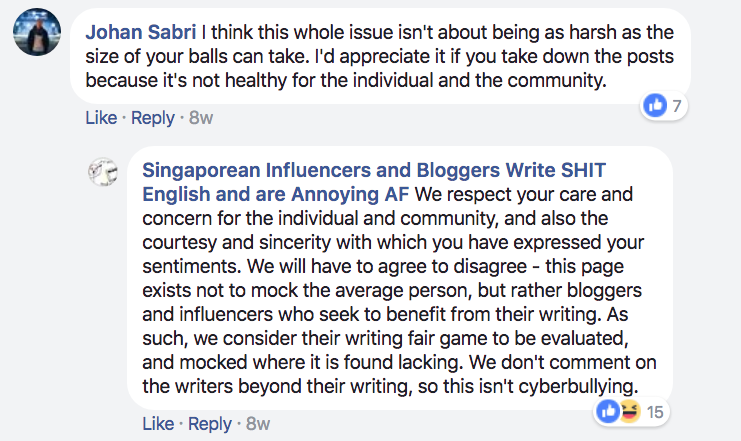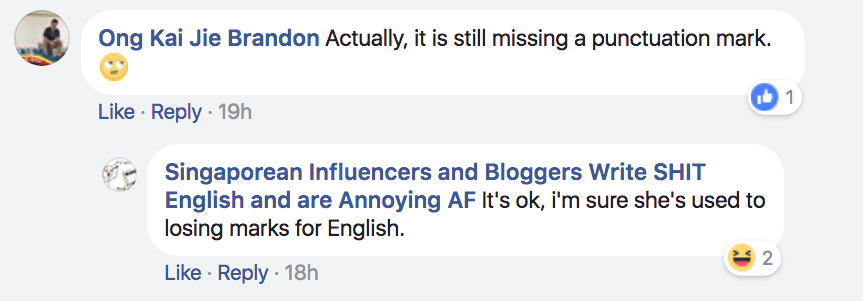We all know that one person.
They made a smart retort once, three years ago, but continue to bring it up everytime you meet. They use “sarcasm” to make others the punchline of their jokes, especially targeting people who have no way of retaliating with the same degree of ‘wit’. Then they imply those who take offence or don’t understand their sense of humour “can’t take a joke”.
Some may call their behaviour pretentious and mean, only to be shot down by them. They claim that at least they do it with style.
Mostly, they take no prisoners in their public obliteration of anyone they deem intellectually inferior. (You probably meet their criteria for intellectual inferiority if you use “ur” instead of “you’re” or “your”, use Meitu for your selfies, and often make mistakes with subject-verb agreement.)
On the internet, this person is the Facebook page, “Singaporean Influencers and Bloggers Write SHIT English and are Annoying AF”.
According to them, they comprise a team that has “some 40 years of experience” in related fields locally and abroad, such as “teaching English, comparative linguistics, and professional writing, editing, and proofreading”. So far, they’ve chosen to remain anonymous so that the focus remains on the language criticism.
At first glance, scrolling through this page feels gratifying. The page capitalises on the immense, growing disdain for influencers/bloggers and their ‘superficial’ lives, mainly by criticising their “SHIT English”.
To do this, most of their updates follow a standard format.
First, they pick an influencer/blogger’s social media entry to rip apart. Content isn’t important; it could be anything from a food review to a selfie. Whatever they deem annoying AF that day is whatever will be subjected to scrutiny.
Next, they comb through the text with the pedantic prescriptivist eye of an English teacher living in the 90s, picking out all instances that depict SHIT English.
Finally, they compile and present their suggested corrections, line by line, together with commentary mocking the influencer/blogger. In one post, a blogger’s use of the phrase “with your love ones” is corrected to “‘with your loveD ones’ you stupid cow”. This same post ends with “You want to be an influencer? Please, just cut off your fingers and never write again.”
The blog in question has since been deleted.
Like clockwork, after every update, the comments section fills up quickly. Facebook users tag other friends to get onboard the attack of the unsuspecting influencer/blogger, who has done nothing but mind her own business thus far.

Ultimately, the condescension that carries throughout the Facebook page and its comments is what’s truly annoying AF.
Over text message, they share their criteria for which post they choose to pick on: “First, the influencer must self-identify as an influencer or be receiving benefits in some way from sponsors; second, the post has to be in questionable English; third, the influencer clearly has no idea what they are talking about. Generally, two out of three criteria should be satisfied for the influencer to qualify.”
While they make it clear that they only target those who “seek to gain/benefit from their writing”, they rarely mock articles from any of our local and national media outlets, if at all, even though journalists certainly stand to gain from our writing.
So it seems the issue really isn’t with anyone who writes per se, but those whose writing serves to finance a lifestyle that they disagree with.
Even though they mostly pick on influencers/bloggers, their gripes also imply that anyone who does not speak good English (according to their standards) is professionally, intellectually, and morally inferior.
When it comes down to what’s “good”, there’s no winning with the page’s arbitrary rules. Responding to a comment pointing out that some of the corrections suggested were nitpicking, the page says, “It’s still a redundant and inelegant usage. We’d still call it wrong.”
In another instance, though they have openly rejected “Americanisms”, they also spell “apologize” with a Z, the American way of doing so.
These subjective and inconsistent ‘standards’, coupled with frequent personal attacks on influencers/bloggers, only fuel the sense of uneasiness I experience whenever someone on my feed shares one of their posts.
No matter the original intent of setting up the page, whether entertainment or education, its purpose now resembles pure cyber-bullying.
Interestingly, they deny this. Speaking to us, they also unequivocally refute the notion that what they do constitutes cyber-bullying.
“We disagree, of course. We think that taking criticism personally and calling it cyberbullying is a way of deflecting from the real issue: they really do write shit English. We consider ourselves to be helping to maintain professional standards in a cowboy town where there is no sheriff.”

Criticising them is only fair game. As the page says, “When you start accepting benefits and payments for your writing, you owe it to the public and the client to write correct English.”
However, criticising them for their English neglects the reality of the industry.
Many brands don’t engage influencers/bloggers for their impeccable English. Instead, they get hired for their engagement, follower count, style and aesthetic, or online persona. If their copy lacks grammar mistakes and is beautifully articulated, it’s just a bonus.
To criticise influencers/bloggers for their English isn’t just missing the point. It’s also picking at low-hanging fruit. Harping on an influencer/blogger’s language capabilities is mostly irrelevant to the larger ecosystem in which they thrive, and feels like a flimsy argument that exists merely so one can get the last word in.
This doesn’t mean that influencers/bloggers are absolved of all responsibility to work on their English. But without brands and companies that engage influencers/bloggers for exorbitant amounts of money, few people would even consider it a viable career option in the first place.
Instead of singling out influencers/bloggers, it would be more productive to demand brands to be more stringent when selecting influencers/bloggers to market their products. After all, any other marketing collateral goes through rigorous copy editing, so it makes sense that one of the most fundamental requirements for influencers/bloggers should be a good standard of English too.
Giving a pass to anyone who doesn’t meet the mark reinforces the fact that, as long as an influencer/blogger looks conventionally pretty, sloppy English is no issue.
Not only does this encourage a culture that prioritises superficial looks above everything else, including basic writing skills, it doesn’t motivate influencers to improve their English standards either.
This seemingly ‘low effort and high reward’ system, which influencers/bloggers are part of, makes the entire industry annoying AF and earns them haters by the dozens.
So, if there were anything of these influencers/bloggers and their industry worth criticising, it would be their unoriginal social media content and personal marketing strategies, and the similarly uncreative brands that continue to enable them.
For instance, we once wrote about Insta-prop boyfriends, who represent a larger phenomenon of men who serve to enhance their influencer girlfriends’ personal branding.
Nonetheless, perhaps the main reason the page is still going strong is because it’s easier to point fingers than to look at the bigger picture. They also appear to speak what’s on everyone’s minds, and have an enemy in common with the majority, i.e. influencers and bloggers.
No doubt, having good English may increase an influencer/blogger’s ‘like’ to follower ratio, boost their engagement, or get the client a higher conversion rate for whatever product they’re marketing.
That said, even though it may appear like they’re doing the industry a favour by calling out SHIT English, make no mistake, the page could not care less.
They exist solely to ridicule.
If there’s anything worse than having SHIT English and being annoying AF, it’s pretending that these observations add any value. Their supporters don’t do them any favours either, adding fuel to fire with occasionally worse barbs. If only they were self-aware enough to accept that the industry culture of accepting SHIT English isn’t going away anytime soon, and that what they do is absolutely cyber-bullying. At least then one could give them credit for being truthful.
But unapologetic honesty would mean equally unfiltered bravery to look in the mirror.
Unfortunately, they may not like what they see.






